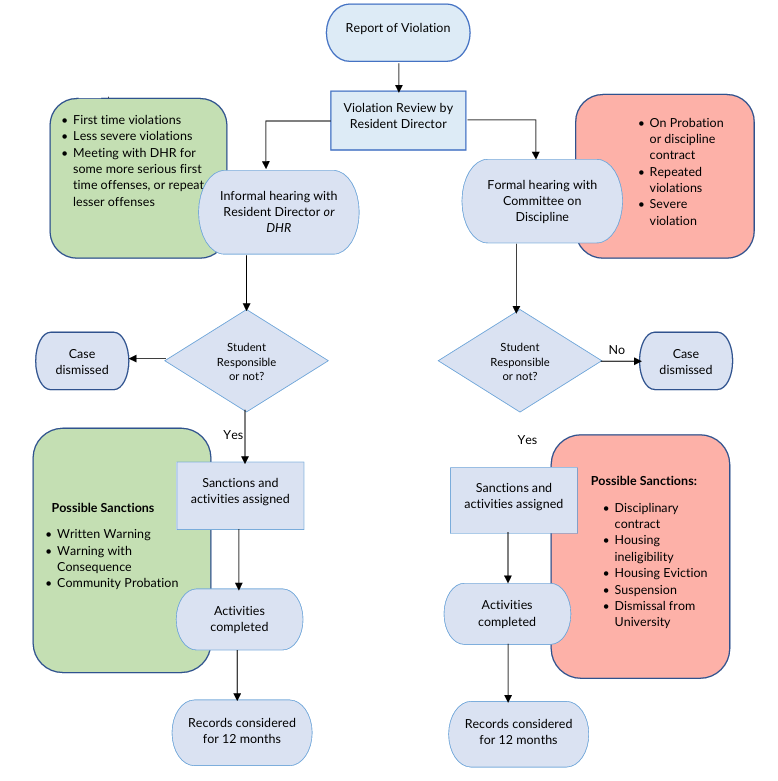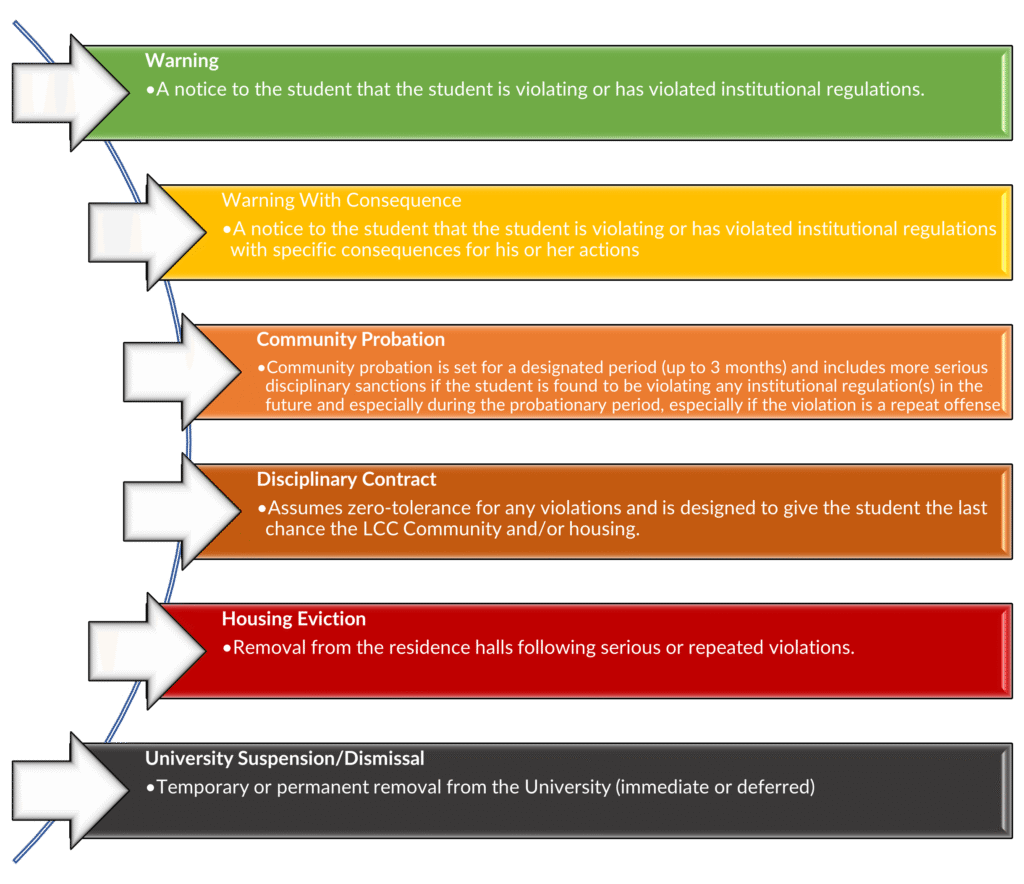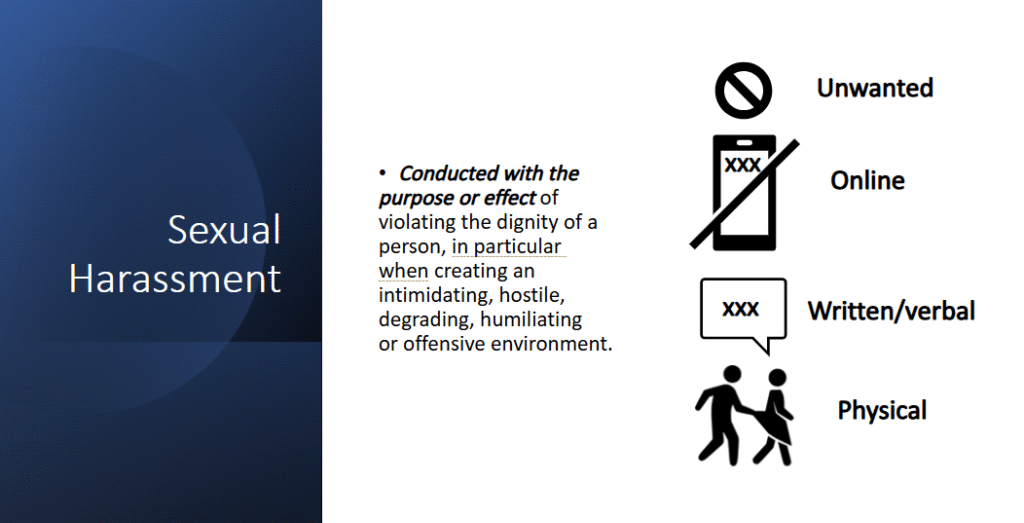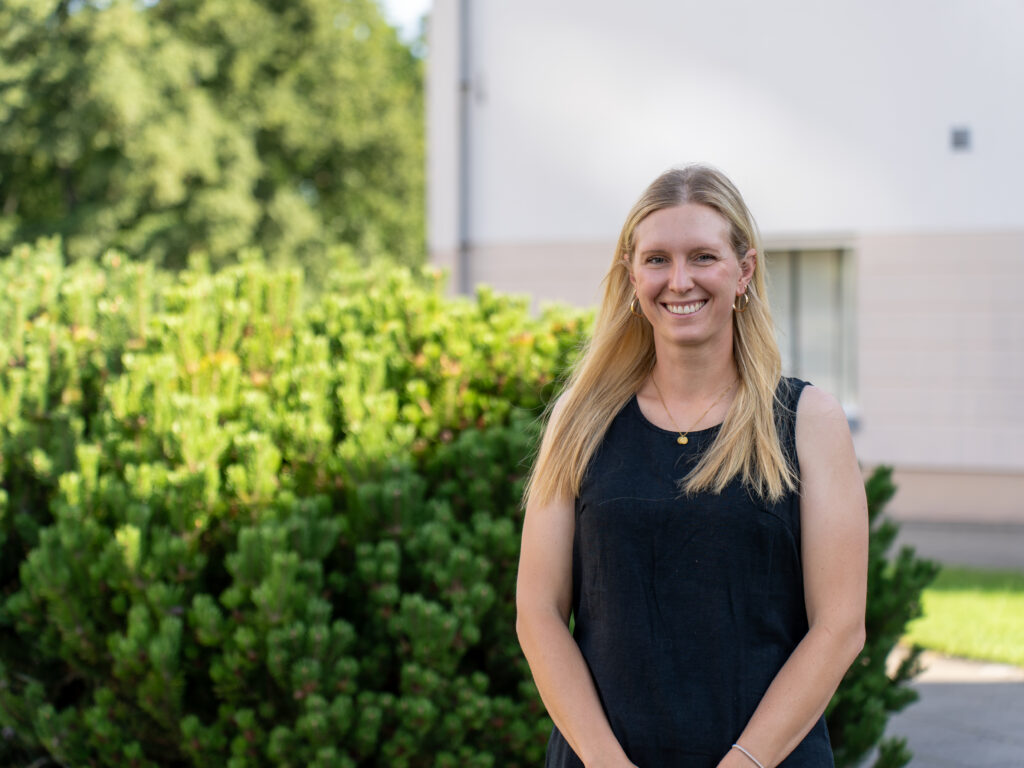All Student Life Policies
The following is a quick summary of policies, rules and guidelines for students to follow, alongside the link to the full text of a policy. Students are expected to know and follow all student life policies.
| Policy Title or Violation Category | Policy Number and Full Text | Summary |
| General Expectations | ||
| General Expectations for students | SL.2.01 | You are expected to be a responsible member of the LCC community by attending required meetings, reading emailed and posted information, demonstrating respect for authority, participating in and completing assigned disciplinary meetings and sanctions, and abiding by community regulations. You are always expected to follow the laws of Lithuania. Student Life staff members are permitted to enter any student room at any time if they believe a community living standard is being broken or have other valid concerns. |
| TRP | Temporary Residence Permit | SL.2.01 | All international students are required by law to have a valid TRP in order to attend classes (for a certain period, a TRP could be substituted with the Lithuanian National Visa which gives its visa holder very similar rights and responsibilities as a TRP). It is the student’s responsibility to adhere to the TRP application deadlines communicated to students through their LCC email. TRP is given out only to enrolled students and is immediately canceled for those on academic leave. |
| Destructive Behavior | SL.2.01 | Breaking items purposefully or by negligence is prohibited. Destructive behavior is included but not limited to causing damage or breaking LCC facilities such as making holes in walls, breaking windows, peeling paint, modifying furniture, tampering with equipment, vandalism, graffiti. |
| Theft | SL.2.01 | Do not use, possess, or remove from an authorized area property that does not belong to you without the consent of the owner of the property or other person responsible for the property. |
| General Safety | SL.2.01 | Except in cases of extreme emergency, all entrances and exits from buildings must be from main doors. Roof access is only to facilities and residence life staff for work related purposes. Do not sit in open windows or hang out of windows. Do not enter or exit building from windows. Do not enter or exit through emergency exits except during emergencies. Students accessing or attempting to access closets, and rooms that are not open to students is forbidden. |
| Public Displays of Affection | SL.2.01 | Inappropriate public displays of affection are also forbidden. While consensual hand holding, brief hugs, and brief kisses in greeting or departure are tolerable, inappropriate intimate touching of areas covered by a bathing suit, prolonged hugging, cuddling, kissing in public is not acceptable. |
| Promotions on Campus | SL.2.03 | Posters, flyers, and other event marketing materials need to be posted on bulletin boards ONLY, and only with approval of manager of the appropriate bulletin board. No postings are allowed to be placed on the windows, doors, or walls of any LCC building. All advertisements should have information about who organizes the event. Event organizers are responsible for removing posters, flyers, and other marketing materials within 24 hours after the event. Posters may not contain material that would be in violation of any LCC policy or contain material that is obscene, pornographic, vulgar, racist, sexist, etc. |
| Showing Movies and other Audio Visual Works | SL.2.04 | Movies may be shown on the LCC campus publicly for educational, noncommercial purposes given that the movie was obtained legally (purchased, rented, or borrowed from the Library). Educational purposes are defined as occurring within a predetermined syllabus, non-formal programming (Student Life programs), and for the educational benefit of students. To show a movie publicly for purposes other than education then the event request form needs to be submitted. |
| Use of Computers and Technology | SL.2.06 | Each personal computer (both PC and Mac) connected to wired or wireless LCC network must have up-to-date antivirus software. Smartphones and tablets are the only exceptions to this rule. The IT department reserves the right to deny without a prior warning network access to any unprotected/infected device. Adding personal network communication devices (e.g. wireless router) to a university network is allowed only with the permission of a system administrator. Any misuse of the LCC computer network (illegal downloading/streaming of copyrighted material, hacking, initialization of DDoS attacks, etc.) is prohibited. Each case of abuse will be investigated and prosecuted. Although the LCC network is protected by a firewall and constant monitoring, be vigilant in daily online communication. Do not accept/download unsolicited files (especially with .exe extension) sent via e-mail/instant messenger or follow suspicious links. When in doubt, check with the IT department. |
| Medical Insurance for non-Lithuanian Students | SL.2.11 | All LCC students must have health insurance. Lithuanian, EU students, and non-EU students employed in Lithuania are insured by state insurance, other non-EU students are required to purchase emergency insurance for a visa and TRP eligibility. All students are advised to print their insurance documents and keep them on them from the beginning of the academic year. More information: More information on medical assistance and use of insurance. |
| Events and Calendaring | SL.2.14 | Only officially registered clubs or LCC departments may organize public events. Events must be approved before being placed on the events calendar. Use event request form to request event at least two weeks in advance. You may book a space only after event is approved. |
| Violence, Weapons, Harassment, Assault, Abuse | ||
| Violence | SL.2.01 | Physical assault and fighting with other individuals is prohibited. |
| Hazing | SL.2.01 | Hazing is not permitted at LCC. No individual, recognized student organization, club, team, or any other LCC-affiliated student group is permitted to plan, engage in, or condone hazing, on or off the LCC campus. Hazing includes any activity done in connection with a student organization, regardless of whether or not the organization is recognized by LCC. An act that causes or is reasonably likely to cause another student to suffer bodily danger, physical harm, or significant personal degradation or humiliation, even if no bodily danger, physical harm, or significant degradation or humiliation in fact results. Hazing often occurs at the time of initiating membership into a group or organization, but is not limited to that time frame. |
| Firearms, Weapons, and Explosives on Campus | SL.2.05 | Possession of weapons and explosives illegal in Lithuania including but not limited to the Law on the control of Use of weapons and Ammunition (2002-01-15, Nr. IX-705) will result in a police report as well as disciplinary action. List of prohibited items include: Any type of gun; Hunting knives, switchblades; Martial arts weapons; Brass knuckles; Electric shock devices; Explosives including fireworks; Ammunition for fire arms; Pocket knife or knives greater than 8cm in length that are used for destructive purposes; Counterfeit, replica, or blank-firing firearms or realistic-looking toy firearms, knives, swords; “A” category weapons and ammunition weapons used in military; Self-made firearms; Fast fired weapons, with toxic substances, firearms ammunition with toxic substances; Silent rounds; Hard metal bullets, or in solid metal casing; Laser sights, except for sports use laser sights; Blackjacks, stars and other strike and throw type weapons. |
| Harassment and Sexual Harassment | SL.2.09 | Harassment (verbal, written, graphic, and/or physical) that is threatening in nature or any form of harassment including sexual harassment is prohibited. |
| Retaliation | SL.2.09 | Any negative action against another student that takes the form of punishment or creates a hostile, threatening or uncomfortable environment as a result of their reporting, or perceived action against another student is prohibited and subject to disciplinary action. |
| Other Sexual Misconduct (non-harassment) | ||
| Pornography/erotica | SL.2.01 | Pornography and erotica of all kinds, including both electronic and paper copies, are not allowed. Posters with nudity may not be displayed. |
| Sexually Intimate Behavior | SL.2.01 | Couples in a romantic relationship may not share a room on campus. Acts of sexual intimacy are prohibited anywhere on campus. |
| Substance Use | ||
| Drug Use | SL.2.02 | Drugs are illegal and drug use will not be tolerated. Misuse of prescription drugs is also dangerous and prohibited. Random and suspicion-based drug-testing can be carried out by authorized SL staff. |
| Tobacco Use | SL.2.07 | Tobacco use is prohibited on LCC campus with the exception of specially designated places (smoking huts behind Defehr, and between residence halls) Tobacco use is defined as personal use of tobacco products that include smoking as well as the use of electronic cigarettes, vapes, and the use of smokeless tobacco, including chewing tobacco. |
| Alcohol on Campus | SL.2.08 | Possession, use of alcohol or possession of empty alcohol containers is strictly forbidden on campus. Drunkenness (examples include but are not limited to: slurred speech, vomiting, stumbling or needing assistance to walk, loss of motor coordination, aggression, brief loss of memory or abusive behavior) is not permitted in or around university facilities. Drunkenness or possessing alcohol may result in loss of privileges and being assigned active restoration or even dismissal from LCC International University Housing. Please note: The legal drinking age in Lithuania is 20, but all alcohol possession, use, and presence is prohibited regardless of your age. |
| Housing/Residence Hall Policies | ||
| Student Storage | SL.3.01 | Eligibility, amounts, and length of student storage in residence halls on campus. |
| Housing on Campus | SL.3.03 | Eligibility, application process, housing deposit, room selection, summer housing, wait-list policy, check-ins and check-outs, transfer requests, housing fees, graduate student housing, off-season housing, RA grant eligibility, standards and policies for residents, guest housing and external rentals. |
| Pets | SL.3.03 | Besides fish, all other pets, including visiting pets, are not permitted within on-campus housing. |
| Quiet Hours | SL.2.01 | University housing is a place where people not only have fun, but also study and rest. Therefore, there are designated quiet hours from 22:00 to 08:00 Sunday through Thursday and 23:00 to 08:00 on Friday and Saturday. During quiet hours, noise should not be heard outside from outside the room you are in. In common areas such as kitchens, noise should not be heard in private rooms. Residents will also follow local laws regarding noise outside of the buildings. Klaipeda quiet hours begins at 22:00. Noise levels must be kept low, including in the smoking hut outside these times. Outside of these quiet hours, you be considerate of your neighbors living closely around you. Music should not be played at a volume that interferes with the lives of others in the facility or neighbors outside (at any time of the day or night). |
| Visiting Hours | SL.2.01 | Day visitors to university housing are permitted from 08:00 until 22:00 from Sunday to Thursday and from 08:00 until 23:00 on Friday and Saturday. Out of respect for roommates, after visiting hours no guests are allowed in non-public residence hall rooms. |
| LCC Facilities | SL.3.03 | Cleaning: you are responsible for cleaning your own rooms on a regular basis. Room inspections are performed on a monthly basis. Kitchen cleaning responsibilities will be assigned by the Resident Assistants on a rotation. Trash, including empty boxes left outside of living areas (in hallways, outside of doors, in stairwells, etc.) is prohibited. Fees are assessed for improper checkouts and improper cleaning at checkout. Damages: you will be charged for the damages based on the Room Condition Report. Repair costs will be assessed to all occupants of a room unless one student assumes full responsibility for damages. Cost for the major damages in common areas may be applied to the residents of that floor. You may not detach built-in furniture from the walls of your room or take furniture from public areas to your room. Repair costs may be subject to the discretion of the LCC maintenance department. |
| Use of Keys in Residence Halls | SL.3.05 | You are responsible for your keys. You will be charged a key replacement fee established in the LCC price list. for the lock if you lose a key. Under no condition may you copy a key. Copying keys and using keys to open another residents’ room is strictly prohibited. Students are responsible for keeping their belongings safe. Lock your doors! Only Residence Life Staff Members should have access to Master key, and only use for residence life work functions. |
| Kitchen Duty | SL3.03 13.1 | All residents are required to participate in kitchen duty. Resident Assistant schedules a person for kitchen duty. Kitchen duty responsibilities are posted in every kitchen, and listed in the Living on Campus guide |
| Fire and Electrical Hazards | SL.4.02, SL.2.01 | For safety reasons, electrical appliance usage must be limited. No appliances with exposed heating elements such as hotplates, grills, fryers, griddles, microwaves and space/portable heaters, toasters are allowed to be used in residence hall rooms,. Any use of an electrical appliance requires that the owner monitors the placement of the electric cords (i.e., do not let the cords lie on or next to heating units). All electrical appliances must be attended to when in use. Candles, fireworks, incense are not permitted in university housing because they are also a potential fire hazard. Tampering with fire equipment, covering smoke detectors, alarms, creating false fire alarms is a safety hazard and strictly prohibited. |
| Fire Safety | SL3.03 | Regular fire drills are administered. Failure to participate in the fire drill when present is a violation. Evacuation plans are placed on walls in the residence hall hallways. When you hear the fire alarm, vacate the building immediately and proceed to the Michealsen centras. |
| Winter Break Room Usage | SL3.03 | You may be asked to move out of your room during Winter Break. Your room will be used to house conference participants (Saltshaker Youth Conference, etc) and/or students staying on campus during the break. Students are also provided with an opportunity to place items in storage prior to departure from campus. Access to storage is limited during winter and summer break due to the sheer amount of belongings. |
| Authorized Room Entry and Search | SL.4.05 | Student Life staff members are also permitted to search for and/or confiscate materials not permitted by university housing regulations. |
| Disciplinary and Conduct Policies | ||
| Committee on Discipline | SL.4.01 | See information in “Formal Hearing.” |
| Disciplinary Sanctions | SL.4.02 | Refer to “Sanction Levels.” |
| Self report and Amnesty | SL.4.03 | LCC students may self-report to the Student Life Vice President that they have been involved in a situation where they have violated or may have violated the LCC’s Community standards provided that the specific incident has not come to the university’s attention via normal reporting procedure. When receiving a student’s self-report, Student Life will work with the student to understand the situation, and to assist the student in addressing the situation so that they will be in compliance with the LCC’s Community Standards. The University provides amnesty to individuals who come forward. Approved self-reports will not receive sanctions but may be assigned appropriate interventions, restitution acts, referrals, and/or education. These reports do not become part of a student’s discipline record. However, if there are continued violations of community standards after self-reporting, amnesty will not be granted. The University encourages students who are struggling with substance abuse or psychological issues to seek help. If any student freely brings their own substance use, addiction, or dependency to the attention of University officials, educational options will be explored but will not result in a conduct proceeding or record. |
| Disclosure of Personal Information and Parent Notification | SL.4.04 | Parents and legal guardians of students under the age of 18 may be notified of conduct violations cases in the cases of alcohol possession and use, smoking, and possession of tobacco products. Parents and legal guardians of students over the age of 18 may be notified in the cases of conduct violations when there is potential or real harm to him/herself (suicidal ideation and attempt, hospitalization, serious substance abuse cases, severe symptoms of eating disorders or conduct violations) or other situations when there is a potential or real harm to others (possession and/or provision of a controlled substance, possession of weapons, sexual assault, homicide threat or attempt). |
| Student Engagement and Formation Policies | ||
| Flag Usage | SL.5.01 | LCC owns flags of countries represented in our LCC student body. Flags can be checked out for event use with approval of Intercultural Education Coordinator, but must be returned within 24 hours of event. If not returned, or returned damaged, it is the responsibility of the person or department that used the flag(s) to replace it. |
| Student Representation and Participation | SL.5.05 | The interests of the LCC International University students are represented by the student representative body – Student Council (StuCo). Members of the Student council are full-time, undergraduate students that are elected by the General meeting of the members of the student body according to the procedures established in the Student Council Constitution. Student Council provides students with an opportunity to voice their views, suggestions, and concerns through a proper and efficient process. |
| Student Club Registration and Operations | SL.5.06 | For a club to be officially listed in LCC Club List it has to register with Student Council and renew registration each academic year |
| Fundraising on Campus | SL.5.07 | Fundraising on campus must be donated to a charitable cause or be used for educational purposes (programs, competition, etc.) that benefit the greater community. No member can ever receive monetary gain from the fundraising. Income cannot be given or loaned out under any circumstances to any person. Donation amount is voluntary, and organizers of a fundraiser may not set a price tag for a donation. The organizer of a fundraising activity must obtain approval from the Student Life Office by filling out the Public Event Request form at least one week prior to the proposed fundraiser date. The University reserves the right to impose reasonable restrictions and/or requirements with respect to the time, place, and manner of fundraising activities. Groups promoting fundraisers must clearly communicate the recipients and distribution of the proceeds. Failure to obtain permission to engage in fundraising, or failure to adhere to university policy regarding activities for which permission has been granted, will result in cancellation of the event. An accounting of any funds raised must be provided. |
| Student Wellness Policies | ||
| Exceptional Academic Leave | SL.6.01 | Exceptional Academic Leave may be granted after the normal deadline to request academic leave in instances where it is impossible for a student to continue the semester due to an unexpected physical or mental health condition, a serious, unexpected physical or mental health condition of an immediate family member (A parent, guardian, sibling, spouse, child) who requires care from the student, or a death of an immediate family member. This leave request is submitted to, reviewed and approved by Disability Support Committee. |
| Emergency Care and Management | SL.6.03 | Interest-free short-term loans are available to students who are experiencing temporary financial hardship. Can include assistance with off campus rent or utilities due to an emergency situation, pre-paid medical expenses, emergency transportation costs related to a family death or illness, other emergency situation that impacts student’s ability to fully participate in their academic career. Things that cannot be covered include Fines, legal fees, normal and anticipated academic expenses, costs for non-emergency travel. To request funds fill out LCC Cares form on student success portal page. |
| Students with Disabilities | SL.6.05 | LCC International University seeks to create equal access for all students to the University’s facilities, academic programs, and non-academic programs. This policy provides the framework for admission practices, academic assistance, and the provision of services and support for students with disabilities and complies with the Bologna Process 2020 Documents and the National Program for Social Integration of Disabled People. See full policy for more details. |
| Campus Ministries Policies | ||
| Musical Equipment and Band Practicing | SL.7.02 | Use of instruments needs to be arranged through the Chaplain by emailing chaplain@lcc.lt. Instruments may only be used for campus events and not for personal practice (excluding the pianos in Neufeld and Neumann 6th Floor). Use of LCC instruments by outside groups is prohibited. Occasionally there is a reason to use musical equipment away from LCC. The member of the LCC community who checks it out is held responsible for the equipment and the costs of repairing or replacing any equipment damaged or lost while used away from LCC. It must be arranged with the Chaplain at least two days before any equipment is needed. |
| Bible Studies and Christian Faith Groups | SL.7.03 | All Bible studies and Christian faith groups actively recruiting members and promoting meetings at LCC must be approved by the Chaplain and be open to general oversight from the Campus Ministries office. This is to ensure that all groups align with the Christian mission of LCC since these groups are led by a variety of staff, faculty, and students from a variety of Christian traditions and backgrounds. At LCC we value this diversity, viewing it as a strength of our Christian community, and ask that leaders teach and lead with integrity, openness, and sensitivity amongst the faith community, respecting the Catholic, Orthodox and Protestant traditions. Leaders are welcome to acknowledge their personal theological perspectives and traditions, but at the same time, encourage participants to think critically with regards to the complexities and diversity of Christian doctrines. |
Our Conduct process
Community standards exist to make our living and learning community a safe place that promotes personal and relational growth. On occasions in which those standards are violated, there will be consequences assigned. Every opportunity is explored to contribute to the student’s personal growth and education while seeking to maintain a healthy and safe living and learning environment. The goal of the discipline process and disciplinary sanctions are to help students develop character, personality, and ability. Records of ALL violations (including warnings) remain active for 12 months from the month when the violation was made.

Standard of Evidence. LCC disciplinary process requires a preponderance of evidence for finding an individual responsible for a violation. Unlike the criminal system, which requires evidence “beyond a reasonable doubt”, the University’s disciplinary decision is based on the “greater weight of the evidence.” A preponderance of evidence standard requires that the information show it is “more likely than not” that a violation has occurred.
What to Expect in an Informal Hearing
Informal Hearings are with a Resident Director (RD) or the Director of Housing and Residence Life (DHR). If you were involved in a known incident on campus, the RD or DHR will request you to attend a meeting at a specific time. It is important to respond promptly to this request. If there is a legitimate reason you cannot make it, respond and request a different time in a timely manner.
When you arrive at your meeting, the RD or DHR will introduce themselves and ask you to do likewise. One of the purposes of the meeting is to get to know you better as a student, so expect some questions about your time at LCC.
The RD or DHR will explain what the incident was and what was known about your involvement. Sometimes you are only coming to this meeting as a known witness, and you are not in any trouble. They will make that clear to you.
After explaining the incident and what was informed about your involvement, they will ask to hear your story and response to the incident. It is important to be open and honest. Your honesty and cooperation help bring the best possible outcomes.
The RD or DHR will ask different follow up questions about the incident, or on your attitude or reflections on the incident, now that some time has passed. They will ask you if you accept any responsibility for what occurred. You should answer truthfully, alongside your rationale.
After your conduct meeting, and after all people involved have been met with, you will receive an email with the outcome of the incident investigation. The letter will include whether or not you were found responsible, and if responsible, what the consequence and your sanction level are following the incident. The consequences have due dates, it is important to do the work on time and put thought and effort into your work.
The sanction level for a violation that is being determined by an Resident Director at most will be Community Probation. If the meeting is with the Director of Housing and Residence Life, the result could be up to a Disciplinary contract (review sanction levels for further information).
If you do not show up or participate in the meeting, a decision may be made without your input, or it may escalate to a higher level. Similarly, failure to do the assigned consequences may result in your sanction level being elevated and/or further consequences.
What to expect in a Formal Hearing (With Committee on Discipline)
Due to the severity of a violation or the student’s conduct history or both, some incidents may be determined in a formal hearing with the Committee on Discipline. As such, if found responsible for the violation, the consequence could be Disciplinary Contract, University Housing Suspension or Dismissal, or University Suspension or Dismissal (review sanction levels for further information).
The hearing date is set based on the Committee’s availability. You will be informed via email if an incident will be reviewed at a Formal Hearing with the Committee on Discipline with the date and time of the hearing.
During the hearing, You are allowed to bring a person of support to this hearing, but that person may not speak during the hearing. During the hearing, you will be allowed to share your perspective, any extenuating circumstances, and desired outcome.
If you cannot attend this hearing, you may submit a written testimony as your defense.
At the conclusion of the hearing, the COD will discuss the case and you will be informed the decision within 1-2 business days following the conclusion of the hearing.
If you fail to come to the hearing or submit a statement, the decision made regarding responsibility and consequences is final and non-negotiable.
Participants in a Formal Hearing are expected to:
- Hear a summary of the evidence/report of the violation.
- Respond to the information and present their perspective/further information
throughout the disciplinary process. - Refer to the Student Council for advocacy
- Appeal the decision (see appeals for more information).
Student rights in the process:
- To be active, respectful participants in this process.
- To respond truthfully about their actions, even at the risk of negative consequences.
- To cooperate fully with the investigation, making an effort to learn and grow.
- To refrain from attempting to negatively influence witnesses, other students or faculty/staff members or undermine the disciplinary process in any way.
For more information, please review SL.4.01
Sanction Levels

Review SL.4.02 for more information for more information.
Information Regarding Reporting Harassment
LCC International University seeks to pursue a safe workplace/place of study through relationships that are
respectful, mutual, authentic, and based on trust. It is the policy that no member of the community – students, faculty, administrators, staff, or third parties – may harass any other member of the community.

Reporting
Anyone who is subject to harassment should, if possible, inform the accused that the conduct is unwanted and unwelcome. If an individual cannot directly approach an alleged harasser, he/she can approach one of the designated staff members responsible for receiving complaints of harassment.
If a student believes he or she has been a victim of conduct prohibited by this policy or has witnessed/is aware of such conduct, they are encouraged to notify the Student Life Vice President, AJ Howell (ahowell@lcc.lt) or through this form, which will be received by the Student Life Vice President. Students that become aware of someone in our community who experienced sexual misconduct are encouraged to report.
After receiving the report, the Student Life Vice President, AJ Howell, will inform the Committee on Harassment, which is composed of Hailey Altena (haltena@lcc.lt), Mikayla Gainor (mgainor@lcc.lt), and Preston Teuscher (pteuscher@lcc.lt). The Committee will then reach out to the reporting student to initiate a meeting.
The Committee to investigate can only begin investigation after a report is filed. Informing University officials of violation of this policy does not automatically initiate a formal investigation but will allow the committee to provide that person with a written summary of their rights and options for pursuing an investigation, including information on contacting local police and local resources.



Meeting with the Committee on Harassment
Once a student has submitted a report to the Committee on Harassment, the Committee will invite the reporter to a meeting with the Committee on Harassment within two days of receiving the complaint. During the meeting, the Committee on Harassment will:
- Outline the investigation process and explain the complainant’s rights and the accused’s rights throughout the process.
- Record the dates, times and facts of the incident(s)
- Listen to the complainant’s account and ask follow-up questions
- Ascertain the views of the complainant as to what outcome he/she wants (note: this does not guarantee the results/outcome requested).
- Ensure that the complainant understands the procedures for dealing with the complaint, including the Student Life Self-reporting and Amnesty policy (SL 4.03)
- Discuss possible and appropriate accommodations,
- Discuss and agree on the next steps:
- pursuing a formal complaint, leading to an internal investigation
- submitting an informal complaint, which could result in accommodations on the understanding that choosing to resolve the matter informally does not lead to disciplinary sanctions or preclude the complainant from pursuing a formal complaint if he/she is not satisfied with the outcome
- the pursuit of counseling and pastoral care resources (which can be pursued alongside a formal or informal complaint)
- Students have the right to request than an accompanying support individual be present. The supporting individual can be a friend or counselor who agrees to accompany. The supporting individual cannot discuss details of the case except for with the person bringing forward the case but can help ask questions, clarify processes, and help the student feel supported.
| Step 1: Student Life Vice President receives complaint of harassment via email, electronic form, or in oral form. The SLVP assigns the Committee on Harassment to the case. | Step 2: The Committee contacts the complainant to set up a time to meet. The committee ensures that the complainant understands the process. During the meeting they determine the facts of the incident, determines any necessary accommodations, hears the desired outcome, and outlines next steps. | Step 3: Together with the committee, the reporter decides whether to pursue an informal complaint (goes on record but no investigation), or a formal complaint (the committee pursues a formal complaints and meets with the alleged harasser). |
Next Steps
Privacy will be maintained consistently with an adequate and thorough investigation and appropriate corrective action. After the meeting with the complainant, the two investigators will pursue the following steps:
- ensure that the process is completed in a timely manner (no longer than 30 calendar days). The time can be extended depending on the academic calendar timing or the number of cases currently in process.
- determine whether interim measures or accommodations are needed during the investigation based on initial reporting, location of incident, proximity of complainant to accused, evidence that is immediately available, and ability of the administration to provide such accommodations
- inform the respondent of the allegations and meet to obtain his or her response
- interview third-party witnesses
- review any relevant documents, policies or other information or evidence submitted by the parties
- decide with the involvement of the third member of the subcommittee whether or not the incident(s) of harassment took place
- keep a record of all actions taken
- produce a report detailing the investigations, findings and any recommendations
- share the Summary of Findings with both parties, which includes the outcome, disciplinary actions, and opportunity for appeal
- ensure that all records concerning the matter are kept private
More information about reporting, next steps, the appeal process, and more can be found in SL.2.09 Harassment & Sexual Harassment Policy

